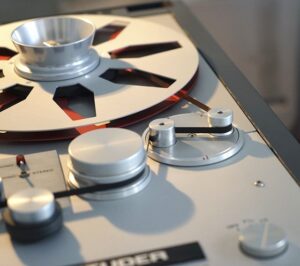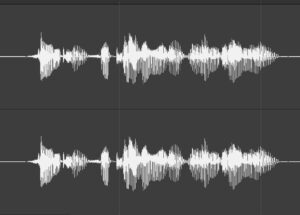I just came across as blog post about one of the key skills in voiceover and audio production work and the content of it really resonated with me. It’s written by radio professional David Lloyd who writes about one of his bugbears when listening to radio broadcasts or podcasts: he asks “does no one learn how to edit anymore?”
 Like me David learnt to edit back in the days of reel to reel tape machines where editing was done using razor blades cutting the tape. You made a mark on the tape for the start and end of the edit and you identified the section to edit by listening to the tape.
Like me David learnt to edit back in the days of reel to reel tape machines where editing was done using razor blades cutting the tape. You made a mark on the tape for the start and end of the edit and you identified the section to edit by listening to the tape.
These days editing is done in software where you can see the waveform and edit on screen. David thinks that people ofyrn use visual cues in the waveforms rather than really listening to the how the audio sounds.
David says:
“Listening is key. It’s tempting to gaze at the waveform and judge that things are OK from that alone. Your eyes can deceive you. There is no substitute for looking away from the waveform and keyboard and asking yourself whether your edit really works to the human ear. That is the test.”
I find myself doing this a lot when I’m editing – by taking away the visual cues you can concentrate on the sound and so discover if it sounds right. Maybe it’s a result of having worked in radio for a couple of decades but I agree with David that editing is there to improve the audio for the listener without misrepresenting what the person is saying. I also agree with his premise that it seems like some people these days have not learnt the “art” of editing – I certainly have heard some shockingly badly edited audio broadcast even on national speech based radio stations who ought to know better,
 In terms of editing skills David argues for taking out “erms” and “ahs” in order to make interviewees sound more interesting and easier to listen to. At the same time he wants editors to leave breaths and pauses in – it makes the interviewee sound more natural. Sometimes the pause before answering when someone is asked a question can actually convey more meaning than the words that come afterwards.
In terms of editing skills David argues for taking out “erms” and “ahs” in order to make interviewees sound more interesting and easier to listen to. At the same time he wants editors to leave breaths and pauses in – it makes the interviewee sound more natural. Sometimes the pause before answering when someone is asked a question can actually convey more meaning than the words that come afterwards.
 These days podcasts are all about authenticity and people on them being their real selves. It’s a laudable notion but I’ve certainly heard some podcasts that would have been much improved by judicious editing – which might have removed some repetition and even possibly re-ordered the content into something that might make better sense for the listener.
These days podcasts are all about authenticity and people on them being their real selves. It’s a laudable notion but I’ve certainly heard some podcasts that would have been much improved by judicious editing – which might have removed some repetition and even possibly re-ordered the content into something that might make better sense for the listener.
David also has a number of other useful editing tips that might be of benefit to people starting out on podcasts or making content for radio.
You can read the blog post one his website
Chris Radley – Voice Over